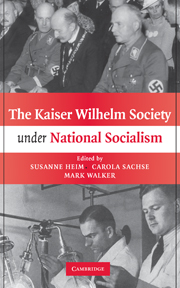Book contents
- Frontmatter
- Contents
- Tables
- Illustrations
- Editors
- Contributors
- Abbreviations
- Archives
- 1 The Kaiser Wilhelm Society under National Socialism
- SECTION I RESEARCH AND PERSONNEL POLICIES
- SECTION II RACIAL RESEARCH
- SECTION III EASTERN RESEARCH, LIVING SPACE, BREEDING RESEARCH
- 8 Kog-Sagyz – A Vital War Reserve
- 9 Raw and Advanced Materials for an Autarkic Germany: Textile Research in the Kaiser Wilhelm Society
- 10 Political Networking and Scientific Modernization: Botanical Research at the KWI for Biology and Its Place in National Socialist Science Policy
- SECTION IV MILITARY RESEARCH
- SECTION V THE POSTWAR “POLITICS OF THE PAST”
- Bibliography
- Index
10 - Political Networking and Scientific Modernization: Botanical Research at the KWI for Biology and Its Place in National Socialist Science Policy
Published online by Cambridge University Press: 29 July 2009
- Frontmatter
- Contents
- Tables
- Illustrations
- Editors
- Contributors
- Abbreviations
- Archives
- 1 The Kaiser Wilhelm Society under National Socialism
- SECTION I RESEARCH AND PERSONNEL POLICIES
- SECTION II RACIAL RESEARCH
- SECTION III EASTERN RESEARCH, LIVING SPACE, BREEDING RESEARCH
- 8 Kog-Sagyz – A Vital War Reserve
- 9 Raw and Advanced Materials for an Autarkic Germany: Textile Research in the Kaiser Wilhelm Society
- 10 Political Networking and Scientific Modernization: Botanical Research at the KWI for Biology and Its Place in National Socialist Science Policy
- SECTION IV MILITARY RESEARCH
- SECTION V THE POSTWAR “POLITICS OF THE PAST”
- Bibliography
- Index
Summary
Since National Socialism was an essentially dictatorial system, many historians assume that it tried to impose total control and ideological alignment on all fields of scientific research. Some main features usually attributed to National Socialist science policy are the primacy of race ideology, closing off international exchange, and, above all, the rejection of “pure research” in favor of research that was “useful” for the nation. Ironically, references to research fields that allegedly remained untouched by these ideological guidelines complement rather than contradict this view. Because the Nazi research administration was utterly incompetent and disorganized, some historians claim, there were “free spaces” enabling scientists to pursue their research in relative independence. According to Kristie Macrakis, the Kaiser Wilhelm Institute for Biology (KWIB) in Berlin was such an island of excellence and “normal” research in an ocean of rigorously politicized science. Under the astute direction of Fritz von Wettstein, Macrakis claims, it was not only able to conduct “pure genetic research untainted by the needs of the government” but also served as a refuge for dissident scientists. It is, however, rather questionable whether “pure research” in the Third Reich was such a heroic endeavor as this interpretation suggests. As Ute Deichmann has shown, research funding was by no means distributed only according to party memberships and “ideological” preferences. The support for the biological sciences was especially generous, and large parts of it were distributed to the elite institutes of the Kaiser Wilhelm Society (Kaiser-Wilhelm-Gesellschaft, KWS).
- Type
- Chapter
- Information
- The Kaiser Wilhelm Society under National Socialism , pp. 227 - 250Publisher: Cambridge University PressPrint publication year: 2009
- 2
- Cited by

